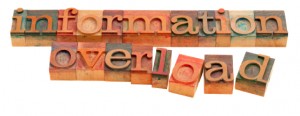Taming the Information Overload Beast
 We make hundreds of decisions every day. Some are easy and simple, but others are more complex and life-changing. In the effort to make the right decision, we might allow ourselves to be consumed with researching, questioning, contemplating, and seeking that one little magic nugget of data that will make our decision straightforward.
We make hundreds of decisions every day. Some are easy and simple, but others are more complex and life-changing. In the effort to make the right decision, we might allow ourselves to be consumed with researching, questioning, contemplating, and seeking that one little magic nugget of data that will make our decision straightforward.
Modern technology makes this easy. We have 24-hour television, Google, Facebook, Twitter, text messages, cell phones – we’ve been conditioned to seek information the instant we have a problem. By consulting all of these sources, we are inundated with advice from family, friends, “experts,” and those who purport to be, all with their own experiences, stories, and knowledge that sometimes contradicts what we thought we knew.
When you’re mired into a decision this deeply, your quest for information may actually do more harm than good. Call it a brain freeze, analysis paralysis, or information overload, but too many details can short circuit your brain to the point where you can’t make any decision at all!
Research proves it. In one recent study, scientists measured activity in the specific area of the brain responsible for making decisions and controlling emotion. As they gave participants more and more information, brain activity increased as expected. But after a constant barrage of new facts and figures, the activity in that area of the brain suddenly dropped off, as if a circuit breaker popped. The participants began to make poor decisions or no decision at all.
Just like clutter in our homes can make it difficult to find things and create physical barriers and obstacles, too much information in our brain can truly be debilitating. When we are confronted with oodles of research, suggestions, and advice, our brains struggle to figure out what’s important and what’s not. And while you’re at it, you impede the brain’s ability to percolate thoughts beneath the surface, in your unconscious that secretly works behind the scenes to connect ideas and spark a creative solution.
So how do you go about making the best decision for you without becoming completely overwhelmed? Here are some suggestions:
- Step back. Turn off the phone and step away from the computer. Do something completely unrelated to the decision at hand and let your brain work out the problem without your analytical interference. Some of the best decisions surface unconsciously.
- Stop searching for choices. Not every situation requires research, and daily life becomes more complicated when you’re constantly looking for alternatives. For example, if you’re shopping with your son for his new bike and he picks the first one he finds, go with it, as long as it meets any pre-determined criteria (size, cost, etc.). By pointing out different features or colors of bike after bike after bike, you’re introducing choices where none are needed.
- Don’t offer choices. If you are making the final decision and know what you want, don’t seek input just to validate your decision. Explain the plan and encourage everyone else to follow along.
- Establish rules. Narrow down your choices by figuring out exactly what you need before you even start shopping. If you’re buying a new computer, choose a price range, make a list of the must-have features, and only shop at two or three stores. You’ll save yourself time and the distress of being overwhelmed.
- Let someone else choose. Take a minute to assess how much you really care about the decision. If it doesn’t matter that much, then let someone else decide (just don’t complain about their choice later!)
- Set a time limit. If it’s not a life changing decision, then don’t spend so much time figuring it out. Give yourself 1 minute to make a choice and move on.
- Go with your gut. Investing a lot of time into researching solutions doesn’t necessarily lead to better decisions. Often times, your first initial reaction or intuition is much better than all the analytical tools you can find.
- Live with no regrets. Not every decision will be perfect, and yes, sometimes you’ll make mistakes. However, it’s not worth your happiness to analyze every decision to find out what you could have had or might have done. Enjoy the present and let go of the past.
Don’t let a decision stop you from moving forward. Try one or more of these tips and see if you find yourself able to take that next step!
